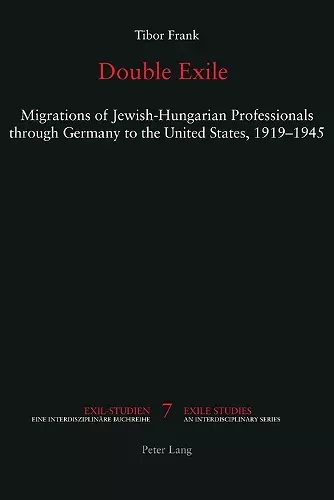Double Exile
Migrations of Jewish-Hungarian Professionals through Germany to the United States, 1919-1945
Tibor Frank author Alexander Stephan editor
Format:Paperback
Publisher:Verlag Peter Lang
Published:24th Apr '09
Should be back in stock very soon

This is a social history of refugees escaping Hungary after the Bolshevik-type revolution of 1919, the ensuing counterrevolution, and the rise of anti-Semitism. Largely Jewish and German before World War I, the Hungarian middle class was torn by the disastrous war, the partitioning of Hungary in the Treaty of Trianon, and the numerus clausus act XXV in 1920 that seriously curtailed the number of Jews admitted to higher education. Hungary’s outstanding future professionals, whether Jewish, Liberal or Socialist, felt compelled to leave the country and head to German-speaking universities in Austria, Czechoslovakia, and Germany. When Hitler came to power, these exiles were to flee again, many on the fringes of the huge German emigration. Emotionally prepared by their earlier threatening experiences in Hungary, they were quick to recognize the need to uproot themselves again. Many fled to the United States where their double exile catalyzed the USA into an active enemy of Nazi Germany and stimulated the transplantation of European modernism into American art and music. To their surprise, the refugees also encountered anti-Semitism in the USA. The book is based on extensive archival work in the USA and Germany.
«Tibor Frank is the world’s foremost expert on Hungarian scholars, scientists, and artists who chose exile or were forced into exile during the first half of the twentieth century. (...) Frank’s description of the adventures of these extraordinary expatriates is as fascinating as is, for instance, his analysis of how some among them helped to develop the atomic and nuclear bombs as well as computers, thereby literally changing the way we live and think today.» (István Deák, Columbia University)
«This fascinating book goes far beyond Fermi’s and Bailyn/Fleming’s accounts and presents the whole story in all its transatlantic richness. (...) Finally, the individual profiles, most especially of Leo Szilard, but also of Michael Polanyi, George Pólya, Theodore von Kármán, and John von Neumann, give the collective story of so many names in so many fields of the sciences and social sciences its subjective and personal touches. At the end I was forced to contemplate the historical contingency that without the Hungarian ‘gimnázium’ there might not have been an American atomic bomb...» (Werner Sollors, Harvard University)
«The book to be read (...) is Frank’s masterly account of a greatly gifted generation, most of the members of which had twice to begin their lives anew in foreign lands.» (Lee Congdon, Hungarian Studies Review)
«Frank covers an impressive range of issues and people, examining with great care the Hungarian, Central European, German and American layers of the émigré question, returning time and again to the notion of the ‘Hungarian genius’ and the idea that emigration studies should further differentiate national origins, so as to become aware of the more intricate effects of specific cultural traditions and educations. In doing so, Frank creates a surprisingly pleasant, considering the subject, and at times page-turning, narrative that provides access to a staggering amount of data and source material about Hungarian-Jewish professionals from 1919 up to the present.» (Ilse Josepha Maria Lazaroms, European Review of History)
«Tibor Frank’s excellently written study introduces the reader to a previously ignored part of history, an enlightening journey from the ‘fin-de-siècle’ Austro-Hungarian Monarchy to interwar Berlin, Weimar, New York, and beyond. The author’s logic is easy to follow, never diverting from the main path, still providing a generous number of examples, closing with individual case studies. [...] His book is not only important from an American-Hungarian relations research perspective but also contributes to the history and philosophy of science as well as the understanding of immigration policies and the scholarship of the receiving cultures.» (Tímea Oláh, Hungarian Journal of English and American Studies)
«The greatest strength of Tibor Frank’s ‘Double Exile’ is his extensive archival research in North America and Europe. Frank’s work is a great example of the potential of transnational history to connect otherwise disconnected national historiographies. (...) Above all, the book serves as a compelling guide for further research.» (Matthew Lungerhausen, Austrian History Yearbook 43, 2012)
ISBN: 9783039113316
Dimensions: unknown
Weight: 710g
506 pages
New edition